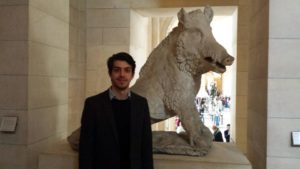
Educational Background: B.A. History (Michigan State University)
Major Field: Modern Europe
Minor Fields: Food & Alcohol; Comparative Empire
Research Language: French and Italian
Committee: Dr. Ronen Steinberg (Chair), Dr. Karrin Hanshew, Dr. Helen Veit, Dr. Sean Forner, and Dr. Charles Keith
Office Hours: Abroad and conducting fieldwork until February 2023. Email for an appointment.
Email: karisnyj@msu.edu
While training in the broader field of Modern European history, I am specifically committed to the study of interwar France and Italy. My research centers around the study of transnational fascism and the “modern” right; the political imaginaries constructing ideas of Europe and race; the politics of population, consumption, and nutrition; and French and Italian political culture more generally.
My dissertation, entitled “Regenerative Diets: Nutritional Modernism, Transnational Fascism, & Europeanism in France & Italy (1922-1940),” hones in on these interests. It tells the history of France’s love affair with Italian Fascism and the influence it had on the country’s rightwing; it maps the transnational networks of Franco-Italian exchange running through the Hexagon. What undergirded the French right’s admiration of Fascist Italy, I elucidate, was its sense of belonging to a common “Latin race.” Fears that its “biological degeneration” had thrown control of Europe into German hands, moreover, drew the French closer to their “Latin sister.” Fascist population politics and promises of a “New Europe,” I demonstrate, helped alleviate this anxiety. They appeared a means of “regenerating” France, imagining a continent with recast hierarchies, and reasserting the geopolitical power of “the Latins.”
To discern the ideological foundation of Franco-Italian relations, my project employs diet as an analytical category. It contends that the idea of a “Mediterranean diet” – a nutritional regime codified by Mussolini – reflected and constructed the political imaginary animating the two nations’ transnational exchange. On the one hand, Fascist food politics demarcated “biological” lines of identification. The French and Italian right, I argue, viewed Mediterranean foods as the “natural” diet of the “Latin race.” The regime thus articulated the common “racial” makeup of the two nations while separating them from other Europeans. On the other, the Italian and French right rooted the “biological degeneration” of the “Latin race” in its abandonment of this “racially” determined diet. Eating Mediterranean was thus a means of “regenerating” physical and social bodies for both groups. In both instances, I argue that food allowed the two parties to imagine themselves members of a “Latin Europe” and reassert its primacy on the continent.
By historicizing the networks of Fascist propaganda in France (such as the Fasci all’estero) and associations of Franco-Italian amity (like the Comitato Italia-Francia/Comité France-Italie), my project contributes to debates on transnational and relational fascism. Historicizing how Italian Fascists and the broader French-right worked toward each other’s politics – and how their imagined geography of Europe fostered this partnership – my project does three things. It challenges the narrative that fascism was “weak” or unappealing in France, it works against the tendency to view Mussolini’s promise of a “New Europe” as a cynical ploy, and it maps the intersection of Franco-Italian geopolitics and population politics around the imperative to produce and consume “Latin foods.” All of this seeks to expand our understanding of fascism, conservatism, nationalism, and Europeanism—of the “modern” right.
Ultimately, then, my work positions itself somewhere between political and food history. It theorizes that food – a physical necessity orbited by a constellation of ideological imperatives – gave abstract political imaginaries and doctrines a material form. Overall, I am committed to showing this—to demonstrating how ideas become embodied and lived through food.